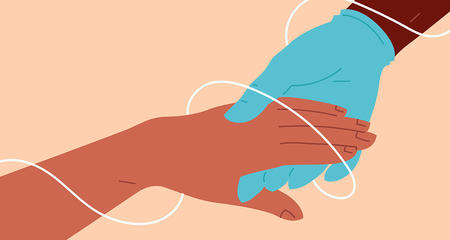Aching, debilitating shoulder pain can slow us down or even prevent us from doing what we want to do. We offer specialty care for all types of shoulder conditions that develop from everyday wear and tear, sports related injuries or a specific injury (also known as trauma). Shoulder injury symptoms can include:
- Pain and stiffness
- Inability to raise your arm over your head
- Lack of strength for daily activities
- Possible shoulder "popping" associated with pain or instability
Shoulder Anatomy
The shoulder is the most mobile joint in our body. It is made up of the collar bone (clavicle), the arm bone (humerus) and the shoulder blade (scapula), which create a ball (humeral head) and socket (glenoid) joint. The rotator cuff is a group of muscles which form tendons that cover the humeral head. It helps to keep the ball centered in the socket as well as put your arm in space. The deltoid muscle is the big muscle on the side of the shoulder that also helps move your arm.

Treatment for Shoulder Conditions
Shoulder pain can be caused from multiple problems, some more severe than others. Most of the time consistent shoulder pain stems from one of the following conditions.
- AC joint separation – in an acromioclavicular joint separation, or AC separation, the clavicle (collar bone) separates from the scapula (shoulder blade). It is a common injury among physically active people.
- Arthritis – the most common shoulder arthritis is osteoarthritis. This happens when the cartilage on the ball or socket or both has been worn away over time. This pain usually develops slowly over time with loss of motion developing as well. Other less common causes of shoulder pain could be adhesive capsulitis (frozen shoulder), tumor, infection, neck/nerve problems or a fracture.
- Bicep injury – damage to the muscle at the front of the upper arm or to the tendons surrounding it; may include tendinitis and tears from overuse or trauma
- Bankart lesion – a type of labral tear (see below) that occurs in conjunction with a shoulder dislocation
- Brachial plexus injury – stretching, tearing or other trauma to the brachial plexus, which refers to the network of nerves that control the muscles and sensations from the shoulder to the fingers. The most common brachial plexus injuries occur at birth during delivery, but they can also be caused by accidents, sports injuries, falls and severe over-extension of the arm. Froedtert & the Medical College of Wisconsin is one of the few facilities in the country to evaluate and treat this condition. Learn more about the Brachial Plexus Clinic.
- Bursitis/tendinitis – an inflammation in the shoulder around the muscles and tendons which causes pain with reaching, lifting, overhead activities and most frequently sleeping. It can make simple daily activities such as getting dressed and even combing your hair very difficult.
- Clavicle fracture – a break in the collarbone, one of the main bones in the shoulder.
- Impingement – occurs when the tissue between the arm bone and the shoulder blade gets pinched as the arm is lifted away from the body. This can lead to bursitis and tendinitis, causing pain and limiting movement. Over time it can lead to a rotator cuff tear.
- Instability – occurs when the ball slips out of the socket of the shoulder. This is usually due to a sudden injury, but can also be from overuse. These episodes of instability can lead to injury to the soft tissue around the shoulder, the cartilage surrounding the socket, and even the cartilage of the ball of the shoulder. At times, these can lead to repeated episodes of instability, which can lead to an increased risk of arthritis in the shoulder.
- Labral tear – a tear in the cuff of cartilage (labrum) surrounding the shoulder joint
- Rotator cuff tear and injury – damage or irritation to the muscles and tendons in the shoulder which connect the upper arm bone to the shoulder blade and provide range of motion. Injuries may be the result of falling, lifting and repetitive activities, especially overhead motions, such as throwing a ball or placing items on overhead shelves. Learn more about rotator cuff repair.
- Shoulder arthritis – various types of arthritis can affect the shoulder, including osteoarthritis, rheumatoid arthritis, rotator cuff arthropathy and avascular necrosis. These conditions can lead to the need for shoulder replacement surgery.
- Shoulder dislocation – when the head of the humerus is out of the shoulder joint
- Sprengel’s deformity – a rare and complex congenital problem in which the shoulder blade is displaced upward, causing a lump in the back at the base of the neck and potentially limiting arm movement on the affected side. Froedtert & the Medical College of Wisconsin is one of the few facilities in the Midwest to specialize in the treatment of Sprengel’s deformity.
- Shoulder fractures – one of the shoulder bones breaks into two or more pieces. Shoulder fractures may occur in the clavicle (collar bone), humerus (upper arm bone) or the scapula (shoulder blade).
- Winged scapula/dyskinesis – when the shoulder blade, or shoulder bone, protrudes from a person's back in an abnormal position. In rare conditions it has the potential to lead to limited functional activity in the upper extremity to which it is adjacent.
Diagnosis and Treatment
Properly treating shoulder pain begins with proper diagnosis. This may involve a clinical exam, x-rays, or possibly a MRI. Depending on your diagnosis, treatment options can include anti-inflammatory medications, physical therapy, cortisone injection or surgery. Our orthopaedic providers will work with you to eliminate your pain, improve your function and get you back to a more mobile life style.
Our board certified and fellowship trained orthopaedic specialists offer a complete range of expertise in the care and treatment of hands and elbows, joint replacement, shoulder, spine and neck and sports medicine. While some injuries can be treated with a sling, cast or other non-invasive treatments, more severe injuries can require surgery. Surgical solutions can range from minimally invasive arthroscopic procedures to total shoulder replacement.
We perform many shoulder procedures with a regional anesthesia (also known as a nerve block or peripheral nerve block). It is used to block the sensation in a specific part of your body during and after surgery. It offers many advantages over conventional general anesthesia including faster recovery time, fewer side effects, no need for an airway device during surgery and a dramatic reduction in post-surgical pain.
Virtual Visits Are Available
Safe and convenient virtual visits by video let you get the care you need via a mobile device, tablet or computer wherever you are. We'll assess your condition and develop a treatment plan right away. To schedule a virtual visit, call 414-777-7700.
More to Explore





